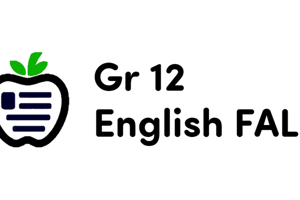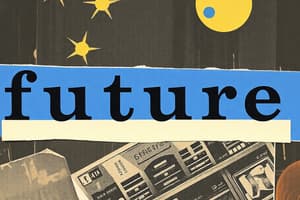Podcast
Questions and Answers
Which of the following is a use of the Future Simple?
Which of the following is a use of the Future Simple?
- To express a prediction about a future event or action (correct)
- To express a habit that happened in the past
- To express a past action that is completed
- To express a present action that is in progress
Which of the following conditional tenses is used to talk about hypothetical or unlikely situations and their consequences?
Which of the following conditional tenses is used to talk about hypothetical or unlikely situations and their consequences?
- Second Conditional (correct)
- Third Conditional
- First Conditional
- Zero Conditional
What is the correct form of the Future Simple?
What is the correct form of the Future Simple?
- Past simple of the verb + will/shall
- Base form of the verb + would
- Present perfect of the verb + will/shall
- Base form of the verb + will/shall (correct)
Which of the following is an example of the First Conditional?
Which of the following is an example of the First Conditional?
What is the correct form of the Third Conditional?
What is the correct form of the Third Conditional?
Flashcards are hidden until you start studying
Study Notes
Future Simple
- Used to express an action that will happen in the future
- Formed using the base form of the verb + will (or shall)
- Examples:
- I will eat dinner at 7pm.
- She will graduate next year.
- They will visit us next month.
Uses of Future Simple
- To predict a future event or action
- It will rain tomorrow.
- The sun will rise at 6am.
- To express a decision made at the moment of speaking
- I'll go to the store.
- We'll have a meeting at 2pm.
- To express a promise or threat
- I'll help you with your homework.
- If you don't behave, I'll take away your phone.
Conditional Tenses
Zero Conditional
- Used to talk about universal truths or scientific facts
- Formed using the present simple in both the if-clause and the main clause
- Examples:
- If you heat ice, it melts.
- Water boils at 100°C.
First Conditional
- Used to talk about future situations and their consequences
- Formed using the present simple in the if-clause and the future simple in the main clause
- Examples:
- If it rains, I will take an umbrella.
- If I study hard, I will pass the exam.
Second Conditional
- Used to talk about hypothetical or unlikely situations and their consequences
- Formed using the past simple in the if-clause and the conditional simple in the main clause
- Examples:
- If I won the lottery, I would buy a house.
- If it snowed in summer, I would be surprised.
Third Conditional
- Used to talk about past situations and their hypothetical consequences
- Formed using the past perfect in the if-clause and the conditional perfect in the main clause
- Examples:
- If I had studied harder, I would have passed the exam.
- If it had snowed last night, we would have gone skiing.
Mixed Conditional
- Used to talk about a hypothetical past situation and its consequence in the present
- Formed using the past simple in the if-clause and the conditional simple in the main clause
- Examples:
- If I had won the lottery, I would be rich now.
- If it had rained, the plants would be healthy now.
Future Simple
- Expresses an action that will happen in the future
- Formed using the base form of the verb + will (or shall)
- Used to:
- Predict a future event or action
- Express a decision made at the moment of speaking
- Express a promise or threat
Conditional Tenses
Zero Conditional
- Used to talk about universal truths or scientific facts
- Formed using the present simple in both the if-clause and the main clause
- Describes cause-and-effect relationships
First Conditional
- Used to talk about future situations and their consequences
- Formed using the present simple in the if-clause and the future simple in the main clause
- Talks about likely or possible future events
Second Conditional
- Used to talk about hypothetical or unlikely situations and their consequences
- Formed using the past simple in the if-clause and the conditional simple in the main clause
- Talks about impossible or unreal future events
Third Conditional
- Used to talk about past situations and their hypothetical consequences
- Formed using the past perfect in the if-clause and the conditional perfect in the main clause
- Talks about past events that did not happen
Mixed Conditional
- Used to talk about a hypothetical past situation and its consequence in the present
- Formed using the past simple in the if-clause and the conditional simple in the main clause
- Combines past and present hypothetical situations
Studying That Suits You
Use AI to generate personalized quizzes and flashcards to suit your learning preferences.




